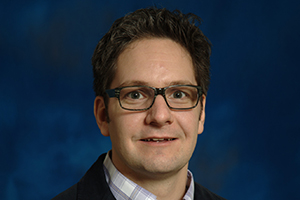May 26, 2017
SVSU research shows police in greater Saginaw respond faster than national average
 Data analyzed by a Saginaw Valley State University professor shows that the average time it takes police to respond to serious crimes in the Saginaw region is significantly less than the national average.
Data analyzed by a Saginaw Valley State University professor shows that the average time it takes police to respond to serious crimes in the Saginaw region is significantly less than the national average.
During the three-year interval of 2013 through 2015, the average time it took police to respond to a call of a “part one crime” in the city of Saginaw and immediate surrounding areas was just more than 7 minutes. That is about 36 percent quicker than the national average of 11 minutes, which was reported in 2013.
Andrew Miller, SVSU associate professor of geography, analyzed some 45,000 calls that Saginaw County 911 received in that time period regarding crimes such as assaults, burglaries and robberies.
“We’re getting really good response time over almost the entirety of the region,” Miller said.
Saginaw County 911 provided the data to Miller as part of an ongoing partnership between SVSU and local law enforcement agencies through the Saginaw County Crime Prevention Council.
“It’s fantastic to see we’re below the average,” said Randy Pfau, the director of Saginaw County 911. “It tells us that we’re doing our job efficiently here on our end. There’s always room for improvement, but it’s great to hear that we’re where we need to be.”
Pfau and his staff chalk up the success to Saginaw County agencies having the mindset that they are all in the public safety battle together.
“It has everything to do with collaboration,” Pfau said. “Everyone at every level working together.”
Miller did not just determine an average response time. Working with Ashlee Oaks, an international studies major from Trenton who graduated SVSU in May; and Dan Johnson, a 2015 SVSU alumnus, he also examined how much quicker or slower an average time was in a specific location.
“Call response times are great, but if the police are repeatedly being called to one location over another, the response time should be faster to areas in need,” Miller explained.
To create such a tool, Miller incorporated both call response times and density of 911 calls for service to produce a map that showed which areas “needed improvement” or had times that were “acceptable” or “good.” Miller presented his findings to the Saginaw County Crime Prevention Council earlier this month.
“We want to give police agencies something that they can see and say, ‘OK, we now know these are the areas where we have to get better response times,’” Miller said.
“We live in a visual world,” Pfau noted. “We know what the numbers are, but to see them in this aspect is great to give you that perspective that all that time and effort and hard work is fruitful and very positive for our community.”
Miller's findings were the latest in a series of presentations he has delivered related to public safety. He and numerous SVSU students first mapped out crime “hot spots” in the Saginaw region and recently analyzed the impact that blight reduction had on crime in the area.
“It’s absolutely great to have that level of professionalism right here in our backyard,” Pfau said of Miller and SVSU. “We work closely with them all the time. Depending on what the concern or situation is, I know we can always call them and they’re a fantastic resource for us.”
Saginaw Township Police Chief Don Pussehl, who leads the Saginaw County Police Chiefs Association, added the relationship between SVSU and local law enforcement is “fantastic.” He credited SVSU for a sustained commitment to the community.
“I've seen over the last five to six years an increased input from faculty members from SVSU,” Pussehl said. “Their willingness to engage in the research and give students an opportunity to have real life experience is a benefit to the community. It sheds a very positive light on SVSU and what their students are doing.”
Pussehl added that former President Eric Gilbertson was a founding member of the Saginaw County Crime Prevention Council, and current SVSU President Don Bachand has maintained the relationship. A former Detroit police officer and SVSU criminal justice professor, Bachand also has a particular interest in research aimed at reducing crime.
